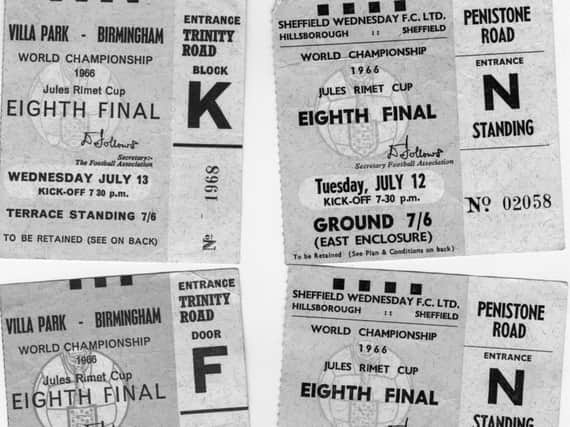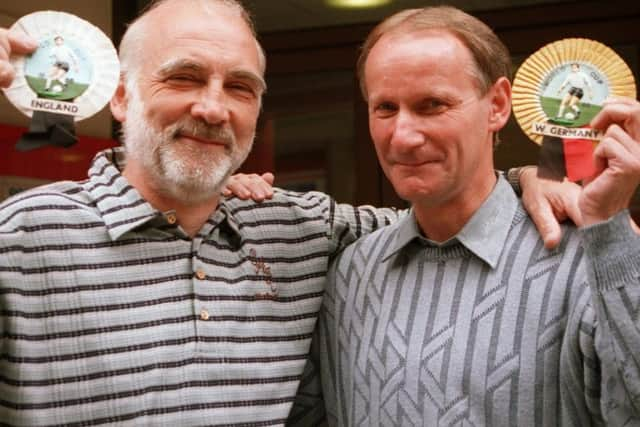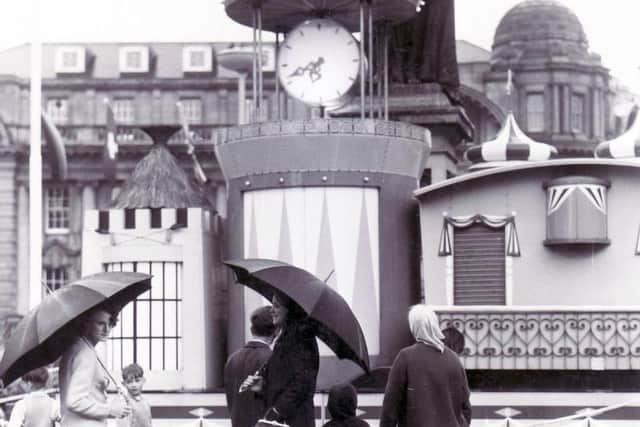Glory days of 1966 when Sheffield was a star of the World Cup


The memories remain, half a century later, of one of the happiest times of my life.
It’s the 50th anniversary of England winning the World Cup and as a young reporter on The Star I witnessed how it entranced the city for a fleeting moment in time over the summer of 1966.
Advertisement
Hide AdAdvertisement
Hide Ad

Sheffield was given three games in the group stage and one in the quarter finals. So the mighty Germans came twice to Sheffield – as quarter-finalists and in a group that also contained Switzerland, Argentina and Spain.
To be included in the World Cup venues was a just honour for Sheffield as one of the two historical cradles of football along with London.
I was to spend a large part of the Sixties in Sheffield and one of the privileges I had was to report on Sheffield FC, the oldest club in the country, founded in 1857, followed by another Sheffield team, Hallam (1860) and a Kent team, Cray Wanderers (1860 also).
I was a youngster in my early 20s, who had moved up to Yorkshire from Kent, and the only reporter on The Star who could speak both French and German. So for most of the news stories of Germans and Swiss arriving in Sheffield, their host city, I was sent out to do the interviews.


Switzerland were to play three times in Sheffield.
Advertisement
Hide AdAdvertisement
Hide AdJust as the memories stay, so the printed word is there to remind me what I reported.
The first game at Hillsborough was Switzerland against West Germany and I wrote: “Everywhere flags waved. Germans and Swiss carried them along the streets. They hung them out of coaches and even the Corporation buses.
“They hung them out of cars and carried them on scooters. They blew horns, rang bells and danced in the streets.”


Their cries were ‘Deutschland Vor’ and ‘Hopp Suisse’ – up Germany and up Switzerland, who also wielded their cowbells.
Advertisement
Hide AdAdvertisement
Hide AdThe flags and banners carried the names of the towns the fans came from and many of them sent greetings both to England and Sheffield.
For example, the small historic town of Fritzlar in the German province of Hessen issued its own greetings to Sheffield. It was a fantastic happy street scene and just as wonderful in the stadium itself. And throughout the tournament the warm feelings persisted, even if the local licensing authorities were far too restrictive in expanding pub opening times. And Sheffield had yet to develop a nightclub culture.
There was none of the football violence we were to see in years to come.


The only trouble that occurred was some pickpocketing in the crowds.
At that time, Sheffield was an isolated city.
Advertisement
Hide AdAdvertisement
Hide AdThe M1 was slowly making its way up north and was still stuck in the East Midlands.
And the city enjoyed few perks from Government since these were gobbled up by Leeds.
People didn’t travel that much, Yorkshire and Derbyshire being most people’s boundaries.
Hence this unforgettable sight of seeing thousands of Germans, Swiss, Spaniards and Argentinians swarming into our city.
Advertisement
Hide AdAdvertisement
Hide AdI wrote too in The Star that “Perhaps for the first time in the history of Sheffield, the city completely lost its parochialism.”
The biggest problem the city authorities faced was where the visitors could sleep at night.
They had assumed that the Germans and the Swiss would book hotels or B&B in Sheffield and the Peak District (where the German squad was based).
But most of the fans were young men, and what they wanted was camping. The city authorities simply hadn’t thought of providing it.
Advertisement
Hide AdAdvertisement
Hide AdWhere all the fans went at night I was never sure but many made their own arrangements with Peak District farmers.
The Star ran a front page headline on it: ‘Homeless’ set a problem for City.
The hoteliers were miffed because they only achieved a 60 to 70 per cent occupancy rate and had laid on emergency beds too on the assumption they would sell out.
Whatever the problems of finding a night’s sleeping place, the Germans and Swiss certainly took Sheffield to heart and I was called on to do some unusual stories.
Advertisement
Hide AdAdvertisement
Hide AdA Swiss man pushed a pram all the way from Switzerland and I walked with him from the Chesterfield border as interested crowds looked on or even joined in the march.
His name was Emil Holliger and he started out from Zurich on June 12 for that first historic game at Hillsborough exactly a month later on July 12.
He went through two pairs of shoes on his travels.
He was a window cleaner by trade and who should give him a wonderful welcome as he entered Sheffield but the Sheffield Master Window Cleaners Association. They then took warm care of one of their own.
A spectacular event was a parade by the Coldstream and Grenadier Guards and the Blues (the Royal Horseguards) through the city. The Coldstream Guards were to play at all four of the Hillsborough matches.
Advertisement
Hide AdAdvertisement
Hide AdSheffield Cathedral held a special service and the Master Cutler welcomed an array of business and civic contacts. And the city was decked with sumptuous flower displays.
Some Sheffielders even opened up their homes to the fans when they heard of the accommodation difficulties.
Harry Charlesworth of Winn Close, Middlewood, put up three German fans he met while they had been searching for camping in the city. He liked and trusted them so much that he and his wife left them in their home while they went out to work.
Harry said: “We’ve been asked to give a welcome to visitors and that’s all my wife and I have done. We are both good judges of character and had no hesitation about leaving the lads at home.”
Advertisement
Hide AdAdvertisement
Hide AdAnd now I must add something more. I was one of those trusting hosts and for my kindliness I have been rewarded over and over again for a lifetime.
The moment that made the World Cup such a wonderful memory for me came at 6pm one day as I sat in The Star office after a long tiring day and was about to go home.
The phone rang and a voice came down the line from a Sheffield man saying a German had just crossed the city boundary on the Worksop Road on a heavy bike with baggage down both sides and the black, red and gold of a big West German flag flying from a pole.
There was a photographer still in the office and together we found the lone cyclist. Almost his first words to me were “Wo ist Camping?” – “Where is camping?”
Advertisement
Hide AdAdvertisement
Hide AdHe was 17 years old and had cycled some 650 miles from his home town Bischofsheim in the Main valley. He had passed through Luxembourg, Brussels, Calais, Dover, London and Grantham, taking eight days to do the journey,
It was getting late and he looked exhausted. He was aiming for the Peak District but he was on the wrong side of Sheffield.
I was living in a small flat in the Sharrow district of Sheffield and then that night I did something rash like Mr Charlesworth. I gave the young German cyclist, Rainer Ruth, my address and the keys to my flat and said he could stay the night.
So he cycled there while I went back to the office to write the story. When I got home, I knew my trust had been vindicated. He spoke no English and so my German went into overload.
Advertisement
Hide AdAdvertisement
Hide AdHaving studied German at school, I had a good vocabulary even if I was a little shaky against the demands of the complicated grammar.
I discovered that he was the reserve goalkeeper for his town team and that his father had captained the team for many years.
Moreover, I soon discovered that he had a 10-ticket block enabling him to see every possible German game right up to and including the final. But I had the identical set of tickets since I had bought them for the twin group venues of Aston Villa and Hillsborough.
He stayed in my flat and then, when Germany made London and the final, at my parents’. Come the final –there was no segregation of crowds in those times – I trooped to Wembley carrying a Union Jack on a pole.
Advertisement
Hide AdAdvertisement
Hide AdHe marched alongside me with the West German flag and we stood together throughout the match.
In those days, I never looked at my watch at a football match out of superstition.
So I had no idea that there was only a minute to go when Germany’s Wolfgang Weber scored a last-minute equaliser to send the World Cup Final into extra time.
So I gave up that superstition.
Over the years Rainer and I have visited each other regularly and he became godfather to my daughter. The Germans take godparenting very seriously and he has become almost a second father to her.
Advertisement
Hide AdAdvertisement
Hide AdSo Germany became a big part of my life and my interests. But of course so has Sheffield and Yorkshire.
I had one more legacy from my days in Sheffield. I married a girl from the coal mining village of Carlton near Barnsley.
The 50th anniversary of the World Cup in England – it means so much for all of us privileged to have been a part of it.